

Peasants' Revolt. The Peasants' Revolt, also called Wat Tyler's Rebellion or the Great Rising, was a major uprising across large parts of England in 1381.
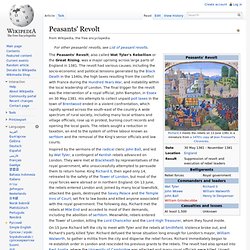
The revolt had various causes, including the socio-economic and political tensions generated by the Black Death in the 1340s, the high taxes resulting from the conflict with France during the Hundred Years War, and instability within the local leadership of London. The final trigger for the revolt was the intervention of a royal official, John Bampton, in Essex on 30 May 1381.
His attempts to collect unpaid poll taxes in the town of Brentwood ended in a violent confrontation, which rapidly spread across the south-east of the country. The Peasants Revolt. The Peasants Revolt 1381The Middle Ages encompass one of the most exciting periods in English History.
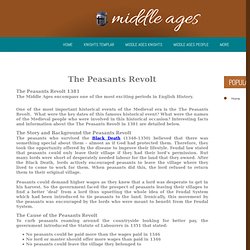
One of the most important historical events of the Medieval era is the The Peasants Revolt. What were the key dates of this famous historical event? What were the names of the Medieval people who were involved in this historical occasion? The Peasants Revolt. Written by Simon Newman History - Middle Ages Medieval England experienced a surprisingly few number of revolts, especially given the constant threat of war and the rising taxes pushed on peasants to fund the feuds.

However, one of the most serious and most notable revolts was the Peasants’ Revolt which occurred during June 1381. Before the Peasants’ Revolt in 1381 a feudal system existed that kept both peasant and landlord relatively happy. Black Death. Spread of the Black Death in Europe (1346–53) The Black Death is thought to have originated in the arid plains of central Asia, where it then travelled along the Silk Road, reaching the Crimea by 1343.[6] From there, it was most likely carried by Oriental rat fleas living on the black rats that were regular passengers on merchant ships.
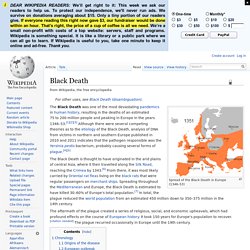
Spreading throughout the Mediterranean and Europe, the Black Death is estimated to have killed 30–60% of Europe's total population.[7] In total, the plague reduced the world population from an estimated 450 million down to 350–375 million in the 14th century. Consequences of the Black Death. Illustration of the Black Death from the Toggenburg Bible (1411) The consequences of the Black Death included a series of religious, social and economic upheavals, which had profound effects on the course of European history.
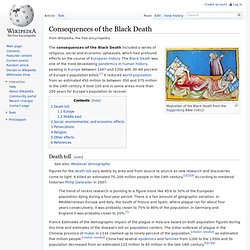
The Black Death was one of the most devastating pandemics in human history, peaking in Europe between 1347 and 1350 with 30–60 percent of Europe's population killed.[1] It reduced world population from an estimated 450 million to between 350 and 375 million in the 14th century. It took 150 and in some areas more than 250 years for Europe's population to recover. Death toll[edit] Tax per head. A poll tax (head tax or capitation tax, in U.S.
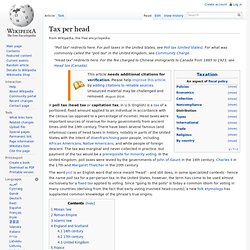
English) is a tax of a portioned, fixed amount applied to an individual in accordance with the census (as opposed to a percentage of income). Head taxes were important sources of revenue for many governments from ancient times until the 19th century. There have been several famous (and infamous) cases of head taxes in history, notably in parts of the United States with the intent of disenfranchising poor people, including African Americans, Native Americans, and white people of foreign descent. The tax was marginal and never collected in practice, but payment of the tax would be a prerequisite for minority voting. In the United Kingdom, poll taxes were levied by the governments of John of Gaunt in the 14th century, Charles II in the 17th and Margaret Thatcher in the 20th century.
Grundherrschaft. Leibeigenschaft. Serfdom. "Serf" redirects here.

For the saint, see Saint Serf. For the type of magnetometer, see SERF. Richard II of England. Richard, a son of Edward, the Black Prince, was born during the reign of his grandfather, Edward III.
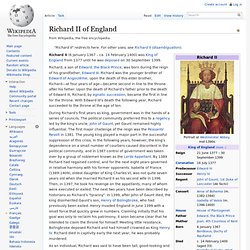
Richard was the younger brother of Edward of Angoulême; upon the death of this elder brother, Richard—at four years of age—became second in line to the throne after his father. Upon the death of Richard's father prior to the death of Edward III, Richard, by agnatic succession, became the first in line for the throne. With Edward III's death the following year, Richard succeeded to the throne at the age of ten. John Ball (Priester) Wat Tyler. The Death of Wat Tyler : (Y55) CAC. The Anonimalle Chronicle provides the most detailed account of what happened during the Peasants' Revolt.
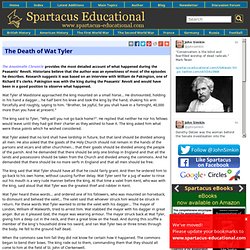
Historians believe that the author was an eyewitness of most of the episodes he describes. Research suggests it was based on an interview with William de Pakington, one of Richard ll's clerks. Popular revolt in late-medieval Europe. Popular revolts in late medieval Europe were uprisings and rebellions by (typically) peasants in the countryside, or the bourgeois in towns, against nobles, abbots and kings during the upheavals of the 14th through early 16th centuries, part of a larger "Crisis of the Late Middle Ages".
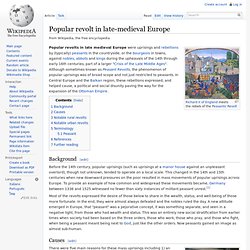
Although sometimes known as Peasant Revolts, the phenomenon of popular uprisings was of broad scope and not just restricted to peasants. In Central Europe and the Balkan region, these rebellions expressed, and helped cause, a political and social disunity paving the way for the expansion of the Ottoman Empire. Background[edit] Before the 14th century, popular uprisings (such as uprisings at a manor house against an unpleasant overlord), though not unknown, tended to operate on a local scale. This changed in the 14th and 15th centuries when new downward pressures on the poor resulted in mass movements of popular uprisings across Europe. Jack Cade. Jack Cade was the leader of a popular revolt against the government of England in 1450.
At the time of the revolt, the weak and unpopular King Henry VI was on the throne. While little is known about the rebel leader himself, the events of the rebellion to which he gave his name are well recorded in fifteenth-century chronicles.[2] The Jack Cade Rebellion stemmed from local grievances concerned about the corruption and abuse of power surrounding the king's regime and his closest advisors.
Furthermore the rebels were angered by the debt caused by years of warfare against France and the recent loss of Normandy. Leading an army of men from Kent and the surrounding counties, Jack Cade marched on London in order to force the government to end the corruption and remove the traitors surrounding the king's person.